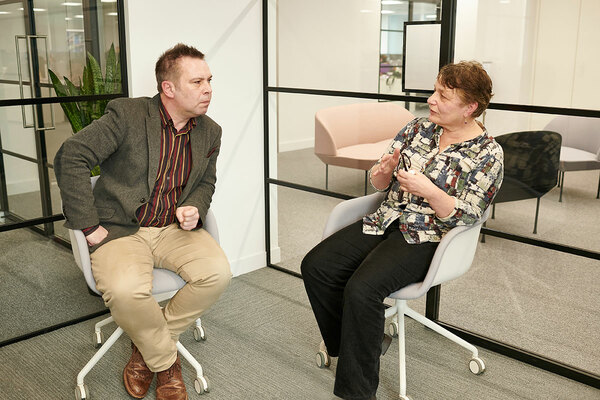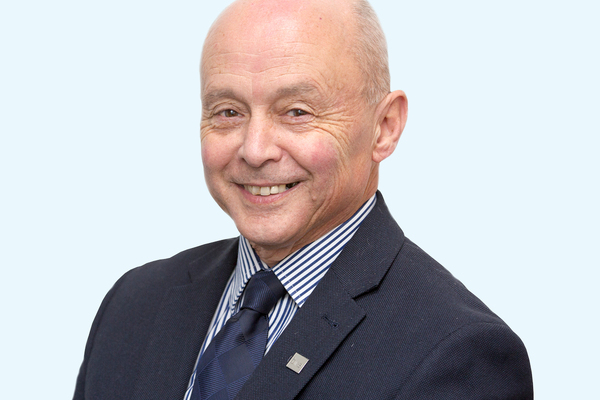I wanna tech you up
Bromford’s ‘innovation coach’ - and pioneer of maintenance drones and Twitter recruitment - takes Carl Brown on a tour of his ‘lab’

Source: Carl Murphy
Inside Housing arrives at an open-plan office at Bromford’s headquarters in Wolverhampton. This office, however, is not known as an office - it is an ‘innovation lab’, where ideas for improving services to tenants are tested by a team of four people.
Recruitment via Twitter, testing drones and Google Glass are among the initiatives that have earned the 28,000-home housing association a reputation as an innovator - or purveyor of gimmicks, depending on your viewpoint.
The ‘lab’ is a conventional-looking office, although there is a ‘fusion’ room, where a large whiteboard full of multi-coloured post-it notes details blue-sky thinking.
At the centre of all of this is a figure who will be familiar - perhaps over-familiar - to housing figures who use social media.
Coach trip
The rule of the innovation lab is that anything goes
Bromford’s innovation coach Paul Taylor
Paul Taylor, Bromford’s ‘innovation coach’, greets Inside Housing wearing Google Glass, which, along with a £380 drone, is the latest experiment by the lab. Google Glass is a spectacle-like gadget that allows you to record, take pictures and communicate hands-free.
The 44-year-old tech enthusiast, who says he used to think about his ideal Atari video game as a kid as a ‘happy thing’ to fall asleep to, speaks to us in a small corner of the lab mocked up as a 1950s living room, complete with plastic fruit, vintage furniture and a china tea set. Books about creative thinking lie on a coffee table.
The Bromford innovation lab was set up in May, and Mr Taylor’s mission here is to test ideas and best practice that can be deployed by the rest of the organisation, and ultimately benefit its residents.
‘We are working on the principle of open innovation - that means a small core team that works to enable the rest of the organisation to develop its ideas,’ explains Mr Taylor, in his soft Black Country accent.
The innovation lab is intended to be a space for anybody in the organisation to share ideas. Mr Taylor is convinced that the best ideas usually do not come from management.
‘The rule of the innovation lab is that anything goes: you can think anything, say anything, criticise anything - it stays in there,’ he explains.
Crucially, says Mr Taylor, the work of the lab ‘is not Bromford work’ as he sees it. If ideas are adopted, they will be expanded and developed by a separate project development team.
Video:
Paul Taylor and Bromford’s drone
Shelf life
The lab uses ‘agile’ working processes, whereby ideas are tested early on by users, rather than developing something to perfection and then launching it.
It has an annual budget of £70,000 and employs just four full-time people. It tests around 50 ideas at any one time. Projects are shelved if they are not judged to be working after 12 weeks.
Mr Taylor says this allows things to be tested rigorously in a sector where, in his view, so many ideas they are not properly evaluated before being rolled out.
‘There are not many fantastic examples of people in the social housing sector that have well-defined approaches to innovation, which I find really odd - they should be the organisations that can really change lives.’
Cloud concept
Mr Taylor prefers to reflect on broad themes or concepts, rather than specifics. When asked what the lab will be working on, he says ‘it could be anything’ and then says it is too early to give ‘real examples’ of its work.
When pressed, however, he says the lab is looking at the marketing of supporting supported housing and work on employability from the ‘point of view of the customer’.
Surely this is no different from what many housing organisations are doing anyway?
Mr Taylor says: ‘I’m perfectly comfortable if some of the things don’t appear that radical but have delivered improvements and real benefit to customers.’
For Mr Taylor, housing associations have lost some of the agility to explore new ideas that they had in the 1960s and 1970s when they were the ‘start-ups’ of their day.
‘The massive drive to make huge, mega-associations has come at a cost, and that is usually innovation,’ he adds. This is likely to be disputed by some in the sector, not least those at larger organisations.
Synapse decisions
Less controversial is Mr Taylor’s assertion that social landlords face huge challenges in the future from trends such as the loss of jobs to technology and an ageing population.
He believes housing associations can play a role in rising to the challenges but only if they link up with organisations in other sectors such as health, social care and the private sector.
Sharing and receiving ideas with people outside the sector is a constant theme of Mr Taylor’s. This is perhaps fitting for someone who arrived in housing relatively late, after abandoning a career as a lawyer and working for the Child Support Agency in the 1990s.
Bizarrely Mr Taylor responded to the Bromford job advertisement thinking the role entailed working for a gamekeeper, as it was in Shropshire and involved ‘estate management’.
The desire to reach out to a wider audience rather than just housing professionals also motivated Bromford’s requirement for prospective employees for the innovation lab to apply for jobs through Twitter.
This approach failed to fill any full-time vacancies as those applying did not want to work full-time for a housing association. Bromford has reverted to traditional methods of recruitment.
However, Mr Taylor insists the approach of trying to widen the range of applicants was correct.
‘[Twitter recruitment] was not a gimmick. It was purely to say we are interested in talking to you, regardless of where you live, what you’ve done in the past, what sector you’ve come from or whether you know what a housing association is,’ he says.
Teched off
Video:
Bromford’s drone fails take off
Nevertheless, Mr Taylor admits, all this tech talk can feel remote from the core business of managing and building homes.
After a ferocious Twitter debate erupted in the summer over Mr Taylor’s enthusiasm for testing drones, one well-known housing figure told Inside Housing it was ‘like trying to have a sensible discussion with a cult’.
Mr Taylor admits he ‘used to get really upset’ by such criticism, but is now more comfortable with it.
‘I fundamentally disagree with some people’s views. It is my right to think that and their right to think “Paul’s lost it”,’ he says. For all Mr Taylor’s enthusiasm for gadgets - he excitedly shows Inside Housing a drone during our visit - he is keen to stress that innovation should not just mean a rush to using ‘tech’.

Source: Carl Murphy
‘It would be very easy to blow a lot of money on shiny technology and on new apps but is that going to fundamentally benefit the resident?’
He also warns against ‘sharks’ taking advantage of the sector’s technological naivety.
Despite this, Mr Taylor says the sector cannot ignore technology, and that is why innovation labs are needed to rigorously test ideas. And Mr Taylor believes that residents ‘who understand the ethos’ of Bromford are in favour.
However, he admits: ‘If you go to the man in the street and say, “Bromford is testing Google Glass,” you are probably going to get the reaction you would expect. [They would say]: “Why are you doing that? Why aren’t you fixing my boiler?”’
And, he argues, that the amount of resources devoted to innovation is relatively small.
Yet the criticism remains that initiatives such as the ‘innovation lab’ risk causing further confusion in the minds of the public and ministers about the purpose of housing associations. Would it not be better for the sector to unite around a simple, single message instead?
Mr Taylor gives this argument short shrift: ‘I cannot see how that is going to happen where you have so many different personalities and interests.’
High energy
An hour with Mr Taylor is exhausting. He is bursting with energy and talks excitedly about what are often abstract concepts, frequently flying off on a tangent.
A few days after the interview, and after Inside Housing reveals Bromford’s plan to test drones, Mr Taylor tweets that he is off to a robot shop in Paris - and he is serious.
It is difficult not to feel at times that this is all a bit removed from the day-to-day challenges facing social landlords and tenants.
However, if only a fraction of the Bromford innovation lab ideas change the sector in the future, Mr Taylor may just be seen as a visionary.
Read about the latest technology innovations, including Bromford’s testing of Google Glass and drones at www.insidehousing.co.uk/technology
Taylor’s tech bytes
Technology: ‘It would be very easy to blow a lot of money on shiny technology and on new apps, but is that going to fundamentally benefit the resident?’
Google glass: ‘The principle of being able to anywhere, anytime record and communicate with people without using your hands - that is going to happen.’
Drones: ‘The principle of flying objects being able to record us, photograph landscapes and ultimately deliver things - that is going to happen.’
Other people: ‘I fundamentally disagree with some people’s views. It is my right to think that and their right to think “Paul’s lost it”.’
GROUNDBREAKING OR GIMMICK?: Five Bromford innovations
- Drones: Bromford has purchased and is testing the use of drones to take pictures of roofs and land. Iit is believed this could save money on scaffolding costs.
- Recruitment: Applicants wanting to work for the innovation lab were required to use Twitter
- Google Glass: The lab has purchased the hands-free device and will look at ways it can be used to ‘help staff think of things how customers see it’
- Connect: Bromford has launched a social networking site to help tenants find work.
- Robots: Paul Taylor tweeted he was off to Paris to look at a ‘companionship robot’ with emotions called Pepper.












